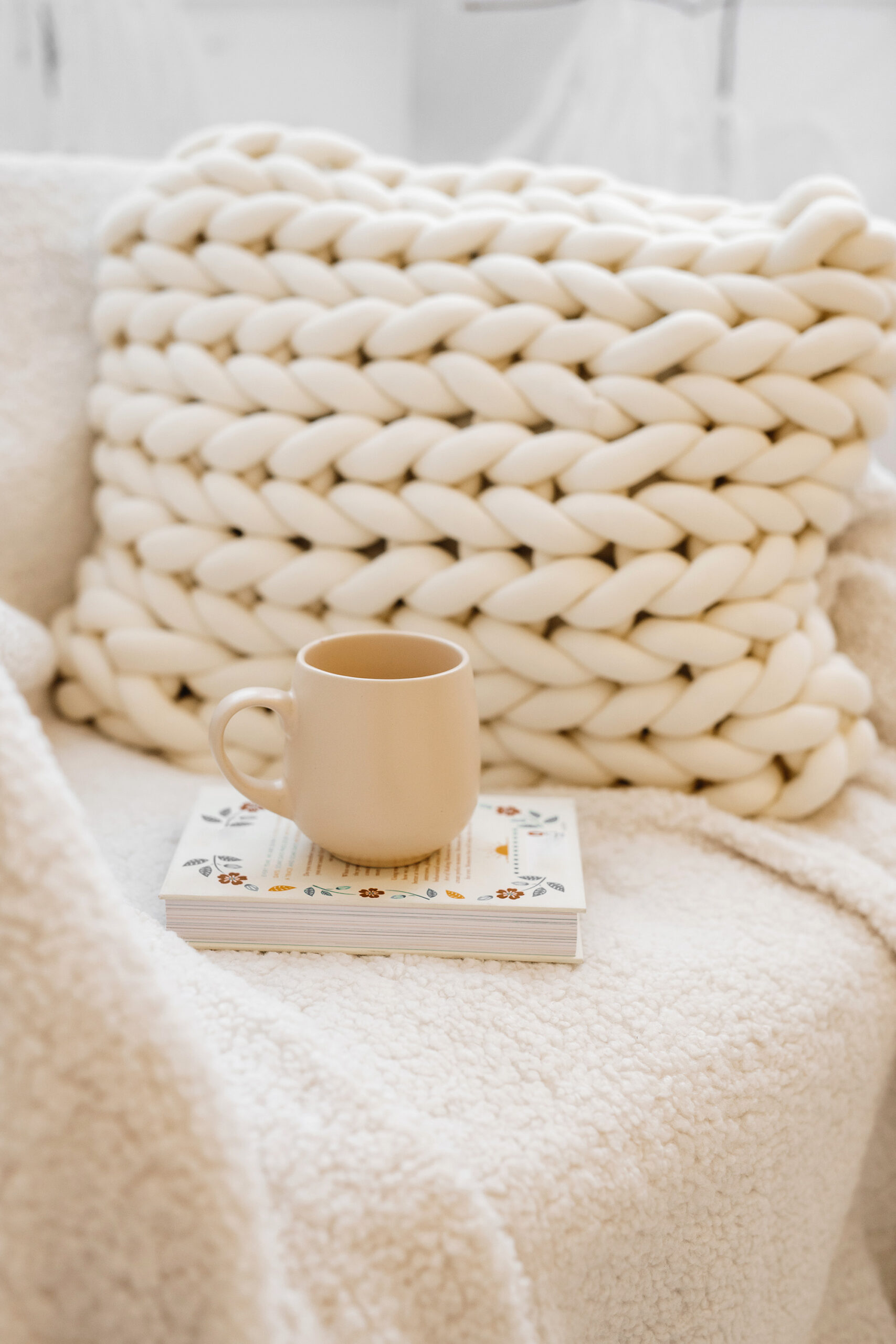Ever feel like your mornings are a whirlwind of stress and chaos? If you find yourself struggling with rushed mornings you aren’t alone! The secret to an easier tomorrow often lies in your evening routines.
Today, let’s talk about how the specific actions you take tonight can set you up for a smooth, worry-free tomorrow.
Let’s get to it!
Why Evening Routines are so Important
In my personal opinion evening habits are the secret sauce to a productive life.
By setting up a routine before you head to bed, you’re basically telling your brain when it’s time to start winding down for the day.
This helps you sleep better and wake up feeling amazing.
Plus, it’s the perfect time to reflect on your day, plan for tomorrow, or simply just let go and prepare for the new day that follows.
Your daily evening routines are what will determine if tomorrow runs smoothly or spirals out of control.
It’s our actions that we take today that determine our tomorrow.
Plus, evening routines create a calm and serene environment and can be the best part of your day! Think of winding down with a cup of chamomile tea, jotting down tomorrow’s to-dos, and setting out your outfit like the pro planner that you know you are.
These steps might seem super small, and honestly they are! Making the tea will probably take you the most time.
But that’s the point.
Your evening routine doesn’t need to take up your entire night.
But these small steps quickly help you become more organized and more productive.
Just. Like. That.
These little habits are the difference between mornings feeling less like a Monday and more like Friday-eve.
Within reason of course.
Sure, Tuesdays might still have that “meh” vibe, but with a sprinkle of these rituals, even they can feel a bit brighter.
Evening routines aren’t just about winding down; they set the tone for a restful night and a productive tomorrow. From managing stress to planning for the next day, the right evening habits can transform your nights and supercharge your days.
Stick around to discover simple, but powerful practices that will not only enhance your well-being but also boost your productivity.
Save this for Later?

Circadian Rhythms
Our bodies run on an internal clock known as circadian rhythms.
These rhythms influence our sleep-wake cycles, hormone release, and even our eating habits.
Essentially, they play a crucial role in determining when we feel awake and when we feel sleepy.
Disrupting these rhythms can lead to poor sleep quality and a ton of other health issues.
To align your evening habits with your circadian rhythm, think about these tips:
- Lower the lights: Dimming the lights in your home an hour before bed can signal to your brain that it’s time to begin winding down.
- Limit screen time: The blue light emitted by phones, tablets, and computers can interfere with your body’s melatonin production, making it harder to fall asleep.
- Stick to a schedule: Going to bed and waking up at the same time every day helps regulate your circadian rhythms. Keep this in mind on your days off. Sleeping in can throw off your cycle.
By paying attention to these natural rhythms, you’ll start to create an evening routine that supports better sleep and follows your body’s natural sleep cycle.
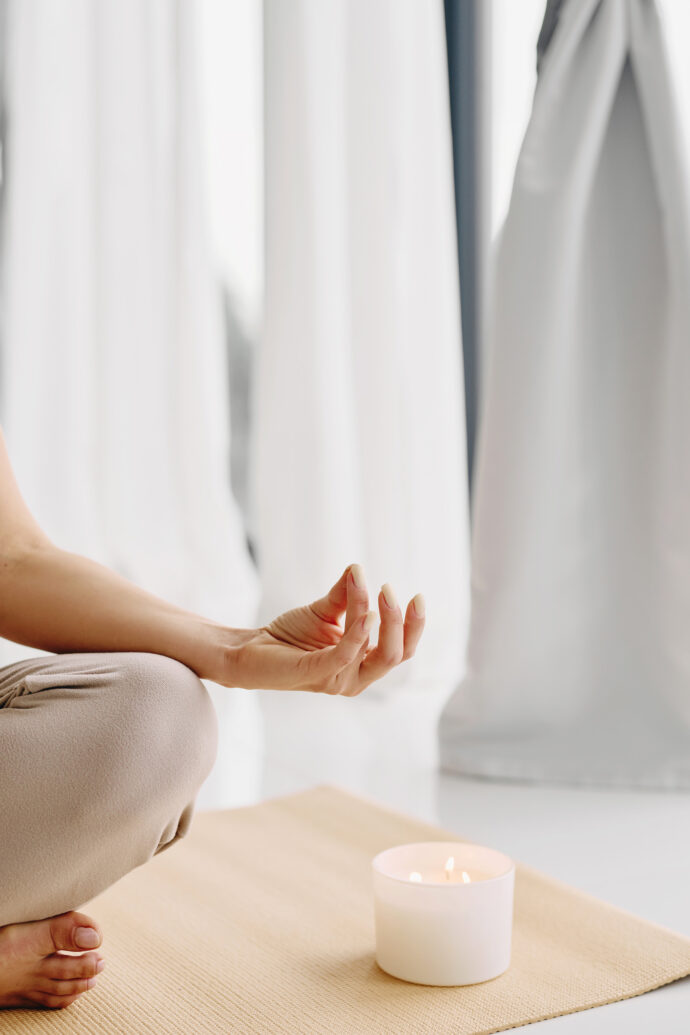
Impact on Mental Health
Numerous studies have shown that a well-structured evening routine can significantly improve your mental health.
When we have a consistent routine, our stress levels drop, and our mood improves.
It’s not just about going to bed on time. It’s about creating a series of calming activities that actually help you detach from the day, unwind for the evening and prepare for a new tomorrow.
Some mental health benefits that come along with a consistent evening routine includes:
- Stress Reduction: Engaging in relaxing activities like reading or meditating can lower your stress hormones, making it easier to transition to sleep.
- Improved Mood: A consistent evening routine can help regulate your emotions, leading to a happier state of mind.
- Easier to Fall Asleep: Evening routines help let your body know when it’s time to start preparing for sleep. Incorporating relaxing activities before bed help your body understand that it’s time to unwind and relax. This makes it much easier to fall into a restful and deep sleep each night.
Research even shows that people who stick to regular evening routines are less likely to suffer from anxiety and depression.
This is because the stability and predictability of a routine gives us a sense of control, which is crucial for our mental well-being.
By understanding the science behind evening habits, you can transform your nights into a sanctuary of rest and relaxation.
Creating a Relaxing Evening Routine
When crafting your evening routine, think about activities you find calming and relaxing, improve your mood and ultimately help you slow down for the night.
Here are some great ideas to help get you started.

Unplug from Tech
We often spend our evenings glued to screens, whether it’s binge-watching our favorite shows or scrolling through social media. Don’t feel bad if this is you. We’ve all been there. And it can be a hard one to break.
BUT it’s an important one to focus on. Excessive screen time can really mess with our sleep cycles… Like a lot.
The blue light emitted from screens can trick your brain into thinking it’s still daytime, making it harder to fall asleep. This is how it throws your circadian rhythm into a tizzy.
I’m not saying you can’t look at your phone all evening. For many of us it’s a form of unwinding in itself.
Just pay attention to the time at which you are on your phone or looking at any screen for that matter. The goal is to simply reduce screen time at least an hour before bed.
This can have a huge impact on your sleep quality. Give it a try for a few nights and see if falling asleep comes a little more naturally.
Now you might be thinking, so what the heck do I do with all this extra time?
Here are some great ideas!
• Read a book: Dive into a novel to escape reality for a bit. I love doing this right before bed because it automatically makes my eyes feel heavy and I get so sleepy just a few pages in.
• Draw or color: Tap into your creative side with some artistic activities. I have found watercolor to be so relaxing to do in the evening.
• Write in a journal: Reflecting on your day can be both cathartic and relaxing. It also helps get those jumbled thoughts out of your head and onto the page. Leaving mental space so you can easily relax into a deep sleep.
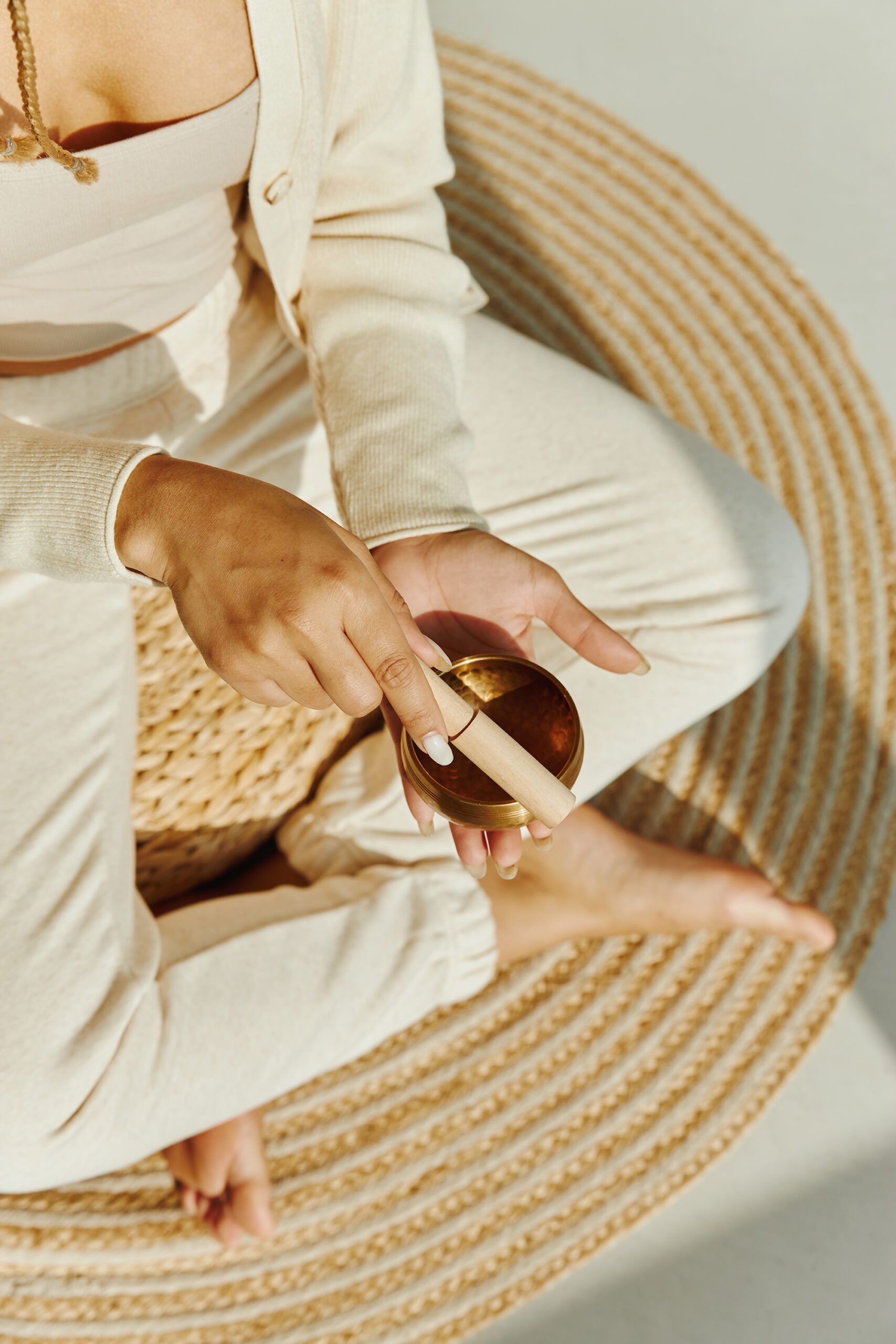
Practice Mindfulness and Meditation
Mindfulness and meditation can be your best friends when it comes to winding down.
These practices help calm and clear the mind and prepare it for rest.
You don’t need to be a meditation guru to benefit from it. Simple techniques can work wonders.
Here are some straightforward methods I swear by:
• Deep breathing: Take slow, deep breaths in and out to help relax your mind and body. I have a whole post dedicated to this topic. You can find it here if you’re interested in learning more.
• Guided meditation: Use apps or online videos that offer guided sessions to help you focus and relax. Doing this while you’re actually laying in bed can really help you fall asleep fast. Many times I don’t even make it to the end of the video!
• Body scan: Lie down and tense your muscles for a moment. Mentally scan your body from head to toe while you do this. Then begin to relax and release each part of your body from your toes up. By tensing your muscles and then letting go you’ll put your entire body into a state of deep relaxation.
These simple practices can help you release the day’s stresses and melt away worries.
In no time you’ll begin feeling your body and mind begin to let go, allowing you to easily prepare for a restful night’s sleep.
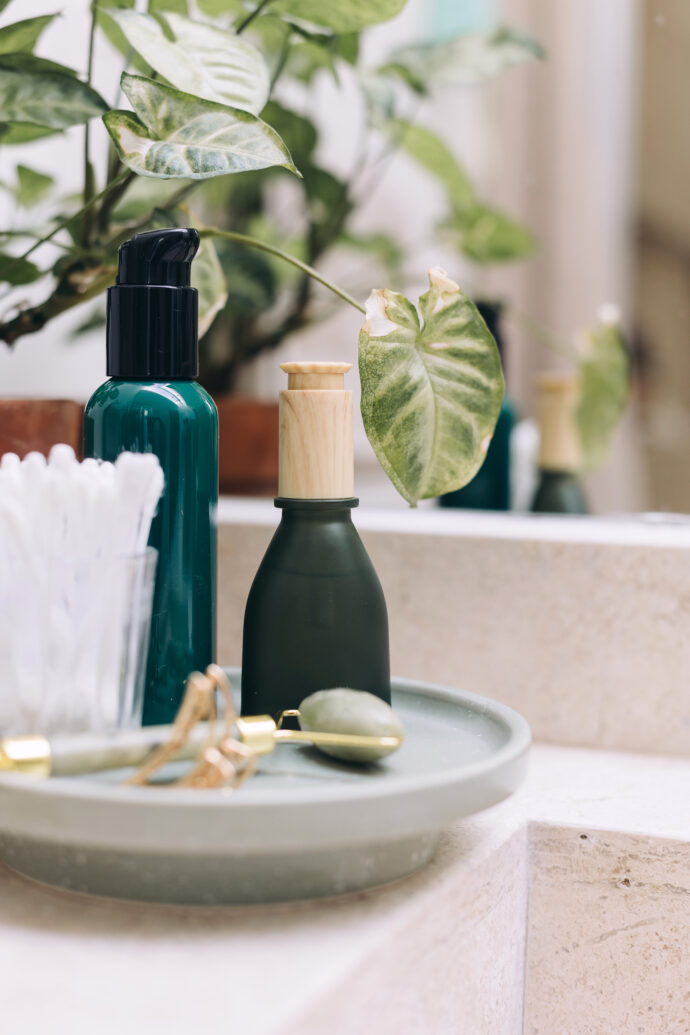
Establish a Skincare Routine
A consistent skincare routine is more than just self-care; it’s a great way to relax before bed.
Taking care of your skin can make you feel pampered and refreshed. It’s another great way to signal to your body that it’s time to unwind for the evening.
Consider adding these steps to your evening skincare ritual:
1. Cleanse: Remove the day’s grime and makeup to give your skin a fresh start.
2. Tone: Use a gentle toner to balance your skin’s pH levels.
3. Moisturize: Hydrate your skin with a soothing moisturizer to lock in moisture.
4. Treat: Apply any serums or treatments your skin needs, like anti-aging or acne-fighting products.
Establishing these habits can make your evenings something to look forward to—a time to unwind, reflect, and get ready for a night of restful sleep.
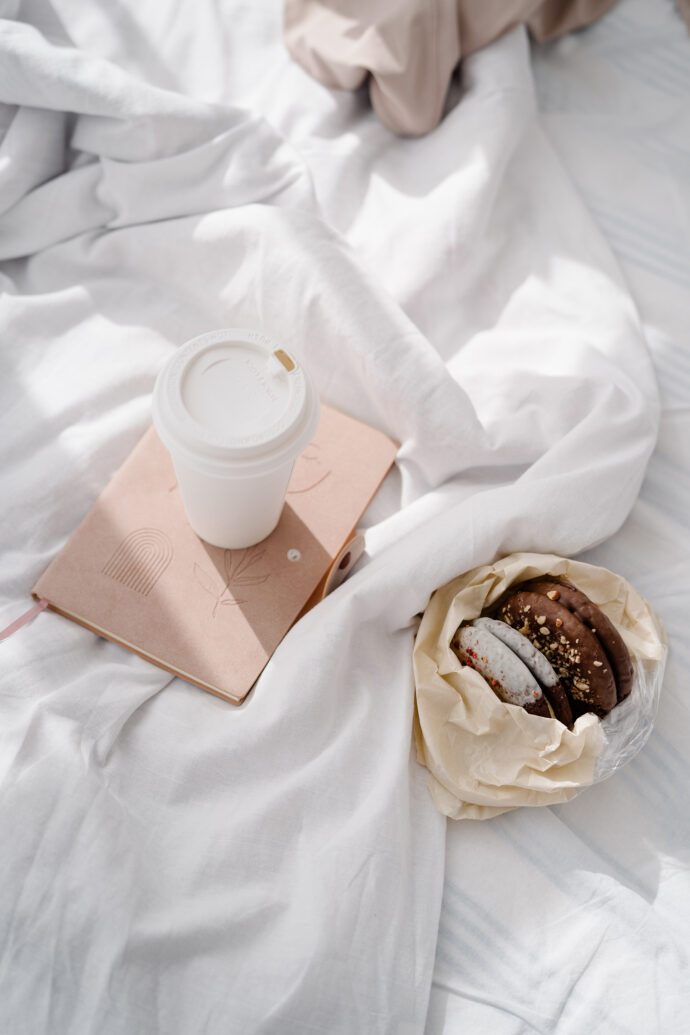
Healthy and Smart Eating and Drinking Habits
Our evening eating and drinking habits can also play a huge role on the quality of our sleep.
Making smart choices can lead to restful nights and energized mornings.
Avoid Heavy Meals
Eating a big, heavy meal right before bed can be a recipe for a restless night.
When we consume heavy foods, our bodies focus on digestion, which can actually keep us awake.
After a big meal your stomach is now working overtime like a factory at full speed. Instead of focusing on sleep, it’s now focused on digesting the food.
Instead, go for light, healthy snacks that are easier to digest.
Some great alternatives include:
- An apple with a small handful of nuts: Both satisfying and gentle on your tummy.
- Bananas: Rich in magnesium and potassium, which help relax muscles.
- Oatmeal: A small bowl can be comforting without being too heavy.
Not only are these options easier on your digestive system, but they also provide nutrients that can help you wind down all at the same time.
Keep your late-night snacks light, and your body will thank you in the morning!
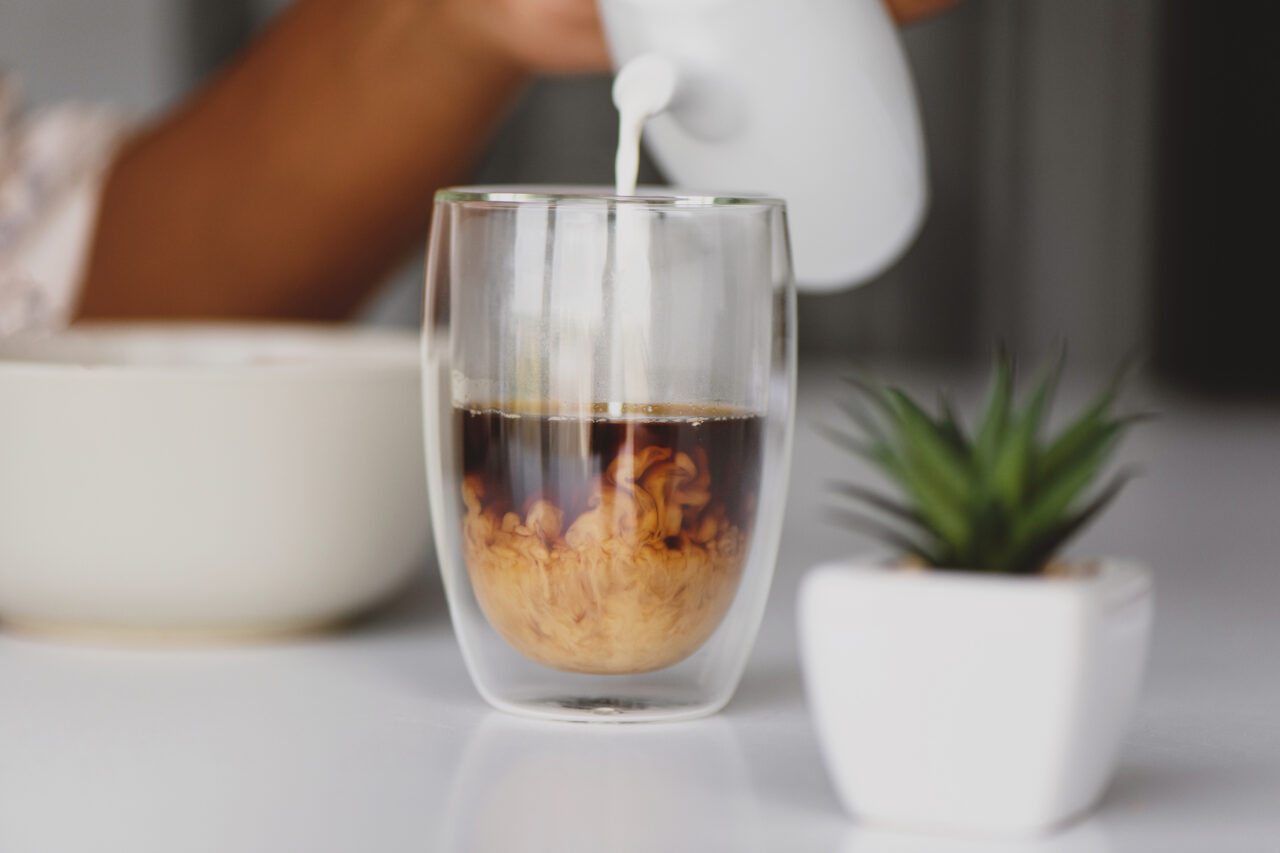
Limit Caffeine and Alcohol
We all know caffeine can keep us wired, but did you know it can stay in our system for hours?
Drinking coffee, soda, or even energy drinks in the evening can really do a number to your sleep cycle.
Alcohol, on the other hand, might make you feel sleepy initially, but it can disrupt your sleep later in the night.
It’s like a wolf in sheep’s clothing—tricking you into thinking it’s helping when it’s actually causing harm.
So what can you drink instead?

- Herbal Teas: Chamomile, Lavender or ginger tea can be incredibly soothing.
- Warm Milk: It might sound old-school, but it really does help you relax.
- Water with a Twist: Adding a slice of lemon to some hot water is super refreshing but also very calming and a great one to incorporate into your night routine.
By limiting your intake of caffeine and alcohol and choosing beverages that promote relaxation, you set yourself up for a night of deep, restorative sleep. Plus it can be a fun way to kick off your evening routine.
You’ll find that after getting into the habit of doing this, your body will get the message that making this cozy beverage is a signal to begin relaxing and getting ready for bed.
You might even find that you begin to feel tried before you even take first sip!
Incorporating these eating and drinking habits into your evening routine can make a world of difference for the quality of your sleep, making early mornings a breeze!
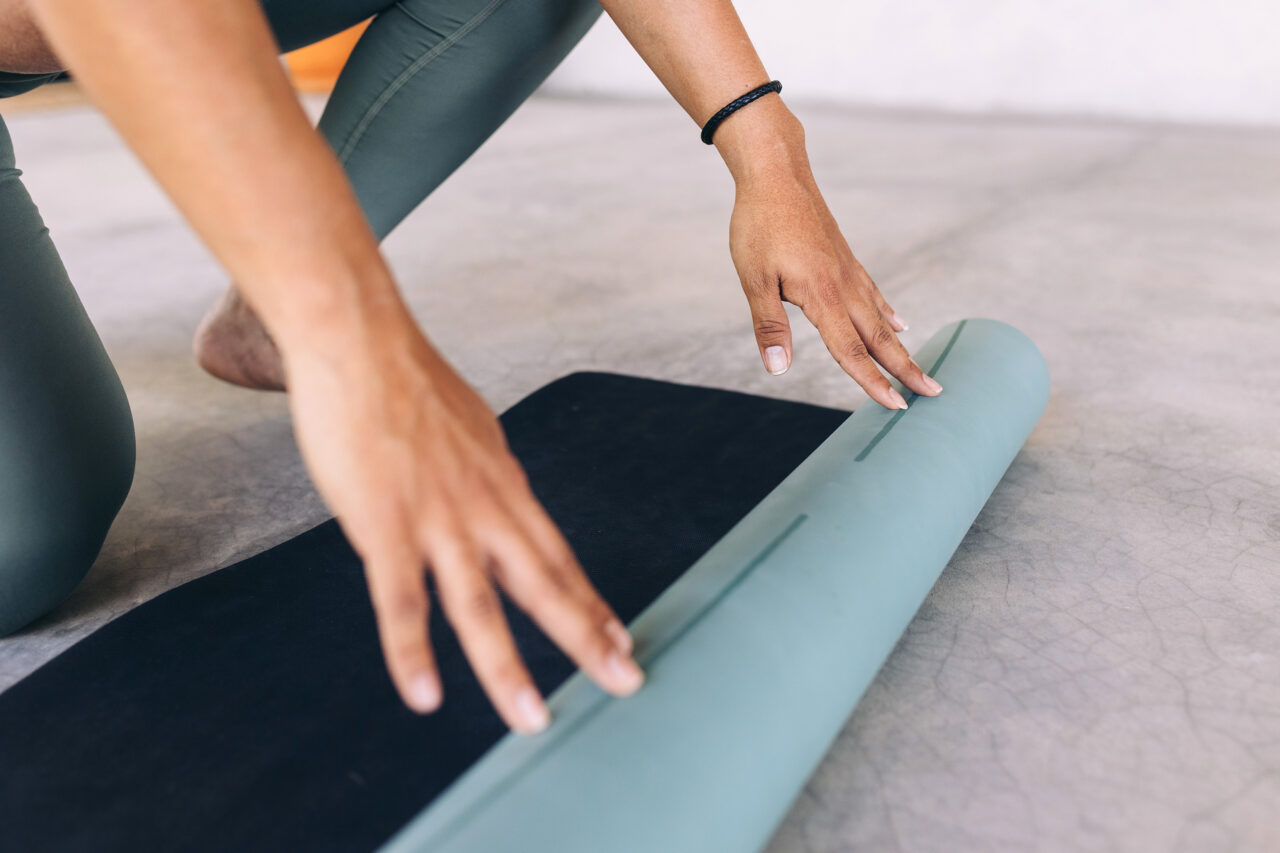
Physical Activities for a Better Evening
Not all physical activities will help you wind down. But the right ones can make all the difference in getting quality sleep and feeling energized the next day.
Here are some great ideas to add to your evening routine!
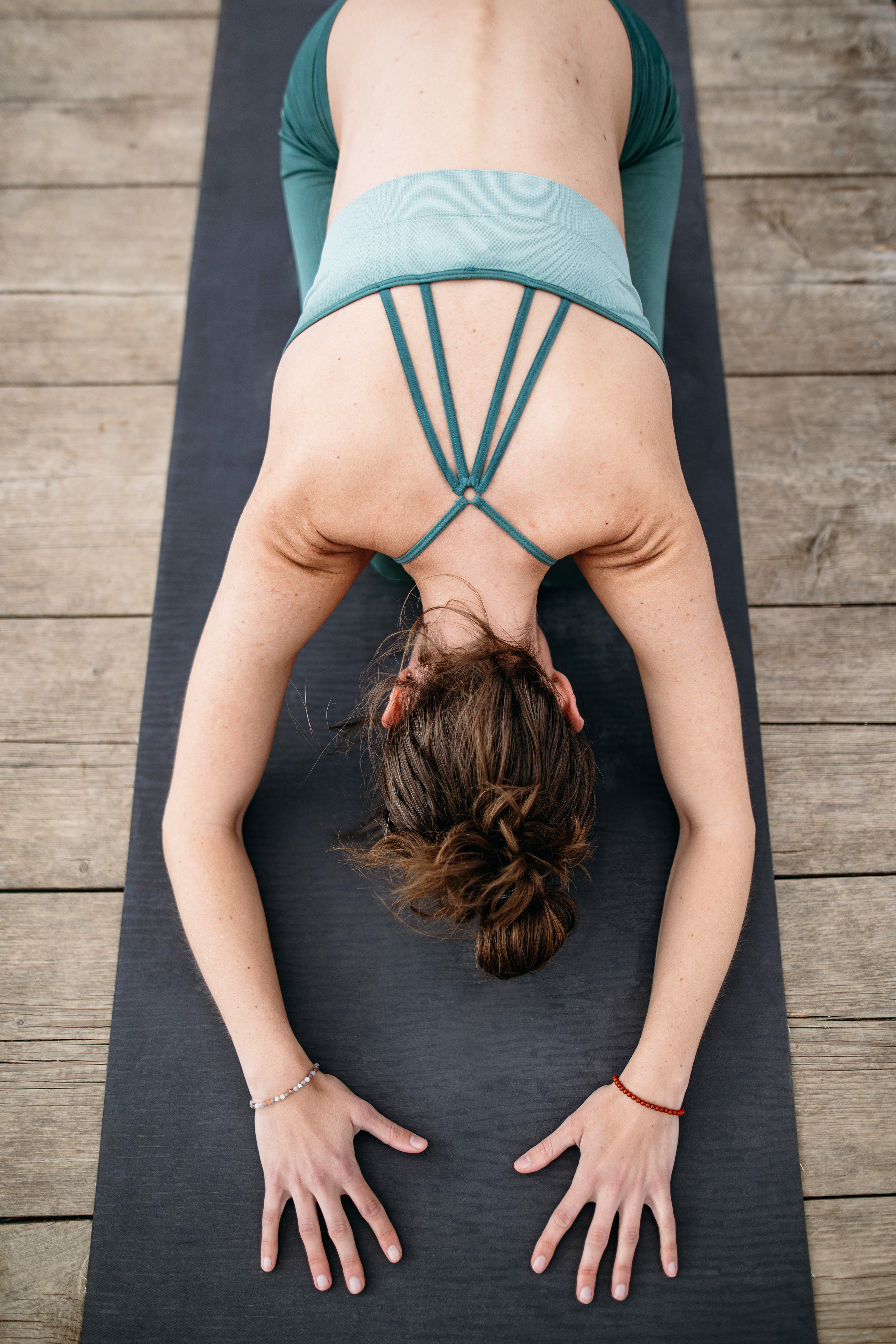
Gentle Yoga
Incorporating gentle yoga into your evening routine can do wonders for relaxation and reducing muscle tension.
These activities don’t require a lot of time or effort but offer immense benefits.
Consider these yoga poses:
- Child’s Pose: This calming pose helps to stretch the hips, thighs, and ankles while reducing stress and fatigue.
- Cat-Cow Stretch: This gentle flow between two poses warms up the spine, eases tension, and improves posture.
- Seated Forward Bend: This pose stretches the spine, shoulders, and hamstrings, promoting relaxation.
Spend about 2-3 minutes in each pose, focusing on your breath and allowing your body to relax.
Simple Stretches
Adding a few simple stretches can also be a great way to begin winding down your evenings.
Here are a few of my favorites:
- Neck Stretch: Gently tilt your head towards your shoulder to stretch the sides of your neck.
- Shoulder Roll: Roll your shoulders forward and backward to release tension.
- Hamstring Stretch: Sit on the floor with one leg extended and the other bent. Reach toward your toes for a gentle hamstring stretch.
Light Walks
Taking a light walk in the evening can be a fantastic way to clear your mind and prepare your body for rest.
Did you know walking not only helps reduce stress but also promotes better digestion and improves your mood?
Here’s how!
Stress Relief: Walking allows you to clear your mind, release built-up stress, and enjoy a sense of calm.
Improved Digestion: A gentle stroll can help your digestive system, making it easier for your body to process your evening meal.
Boosted Mood: Exercise can trigger the release of endorphins, the body’s “feel-good” hormones, lifting your spirits.
From a practical perspective, aim for a 20-30 minute walk; it’s enough to reap the benefits without overexerting yourself before bedtime.
Bring along a loved one or listen to some relaxing music or a podcast to make the experience even more enjoyable.
These simple practices help to soothe your body, calm your mind, and ensure you wake up feeling refreshed and ready for the day ahead.
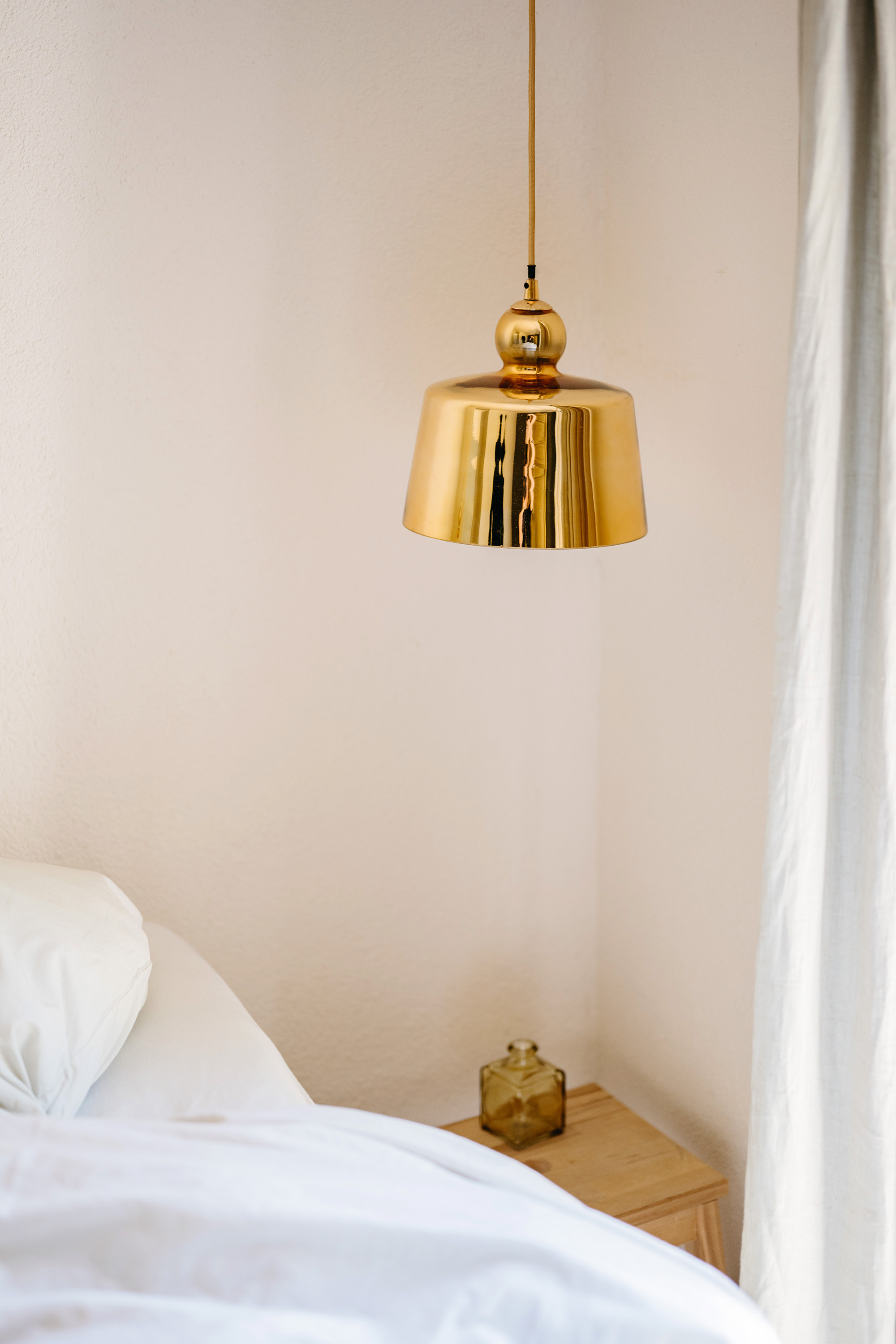
Creating an Optimal Sleep Environment
Your bedroom should be your peaceful place that helps you drift off to sleep.
When the space feels calm, you’ll naturally unwind. But if it’s chaotic and disordered, you’ll sense that too.
There are a few great ways to prepare your space for a restful night. Here are some awesome suggestions.
Control Room Temperature
It’s not just about the comforters and pillows; room temperature plays a crucial role in helping you fall asleep and stay asleep.
Ever tried sleeping in a room that’s too hot or too cold? It’s a nightmare! If I’m even a little too warm it’s all I focus on. If my feet are freezing that’s it, I’m up all night!
The ideal room temperature for sleep is generally between 60-67 degrees Fahrenheit.
Now this is just a guideline. We’re all different. For some this might feel way too cold. Adjust the temperature to what suits you best.
But overall a cooler temperature helps your body drop its internal thermostat, initiating sleepiness and ensuring you stay comfortable throughout the night.
You can use a fan or air conditioner to help cool down the temperature of the room. Circulating air can help keep the room at a cool and steady temperature and it also provides pleasant white noise.
You can also invest in a programmable thermostat that lowers the temperature automatically as bedtime approaches.
Another great option to control temps is by layering your bedding. Having multiple layers allows you to adjust your covers to stay comfortable all night long.
This can be especially helpful if you sleep with a partner. One of you is bound to run warmer than the other. And this is great way to keep you both happy 😊
Keep in mind your body naturally cools down as you sleep, so keeping your room at an optimal temperature can significantly improve your sleep quality.
Minimize Noise and Light
Even small amounts of light and noise can disrupt your sleep, so it’s important to create a serene environment.
Bright lights from electronic devices, street lights, and even nightlights can trick your brain into thinking it’s still daytime.
Similarly, sudden or consistent noises can interrupt your deep sleep cycles.
Minimizing these distractions are a must to make sure you fall asleep quickly and actually stay asleep throughout the night.
Light
• Use Blackout Curtains: These can effectively block out all outside light, making your room as dark as possible. These have been a must for us since we have street lights literally right outside the bedroom.
• Dim Your Lights: Lower the lighting at least an hour before bed to signal to your brain that it’s time to wind down.
• Turn Off Electronics: Power down your phone, tablet, and other electronics, or at least switch them to a “night mode” that limits blue light.
Noise
• White Noise Machines: These create a consistent sound background that can help mask disruptive noises, like traffic or snoring. Hatch is what we use and it’s amazing!!
• Soundproofing: Adding thick rugs, curtains, or even acoustic panels can help reduce noise in your bedroom.
By minimizing noise and light, you can transform your bedroom into a peaceful haven conducive to restful sleep.
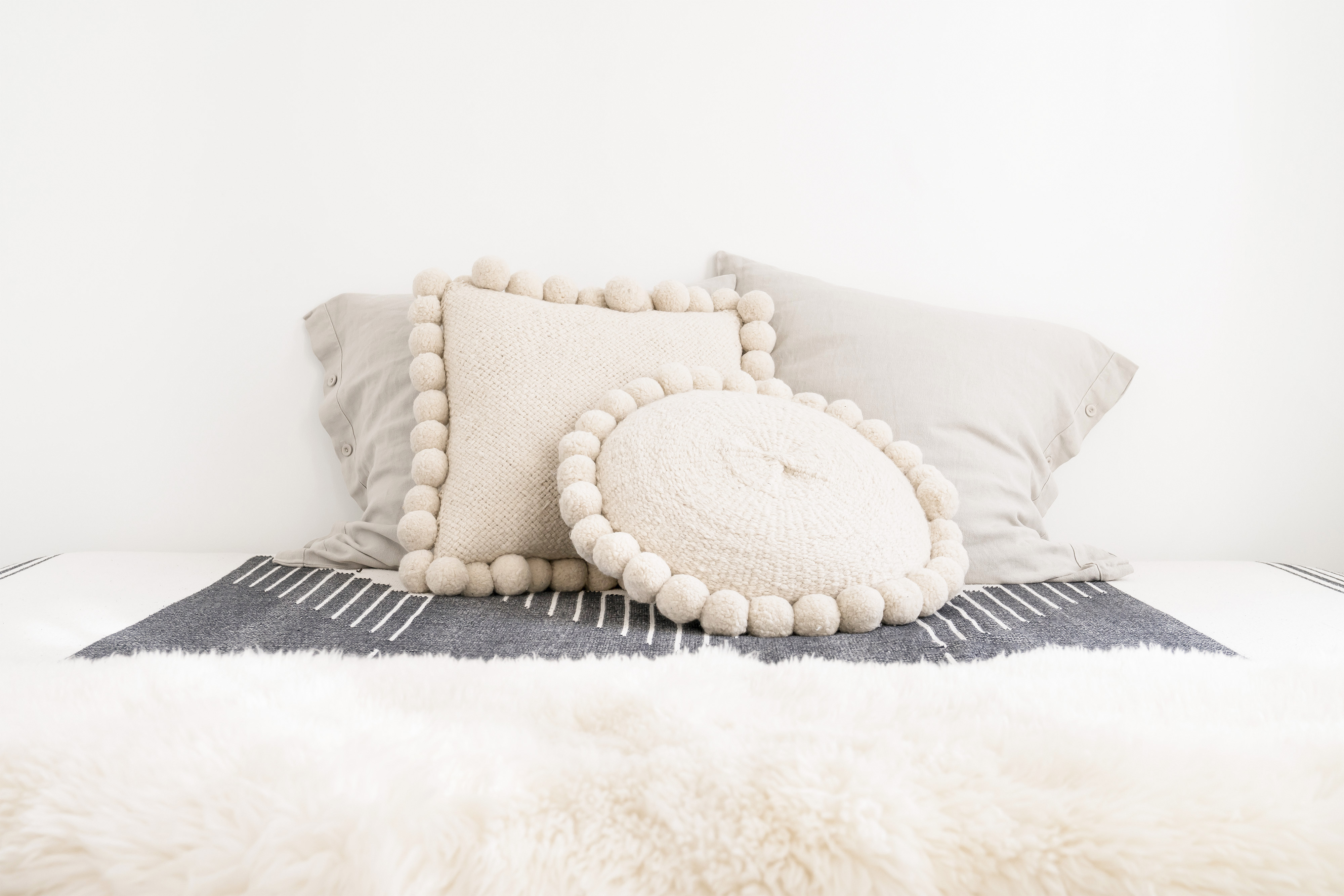
Choose Comfortable Bedding
The right bedding can make a world of difference in your sleep quality. It’s more than just sheets and blankets—think of your bedding as the cozy nest where you recharge each night.
High-quality bedding can improve comfort and help you drift off faster and stay asleep longer.
Sheets and Pillowcases
• Material Matters: Opt for natural, breathable fabrics like cotton or linen. These materials are soft against your skin and allow for better airflow.
• Thread Count: While a higher thread count often means softer sheets, anything above 400-600 can actually trap heat and make you uncomfortable.
Pillows
• Support: Choose pillows that offer the right amount of support based on your sleeping position. Side sleepers generally need firmer pillows, while stomach and back sleepers might prefer something softer.
• Materials: Memory foam or latex pillows can provide excellent support and contour to your head and neck for optimal comfort.
Mattresses
• Firmness: Your mattress should offer a balance of support and comfort. Too soft, and your body can sink in too much; too firm, and it might create pressure points.
• Type: Whether you prefer innerspring, memory foam, or hybrid, choose a mattress that meets your specific sleep needs. Many companies offer trial periods so you can test your mattress before committing.
So remember, as you get your bedroom ready for a peaceful night, focus on the perfect balance of temperature, reduced noise and light, and cozy bedding.
With a bit of time and care, your bedroom can transform into the perfect sleep haven.
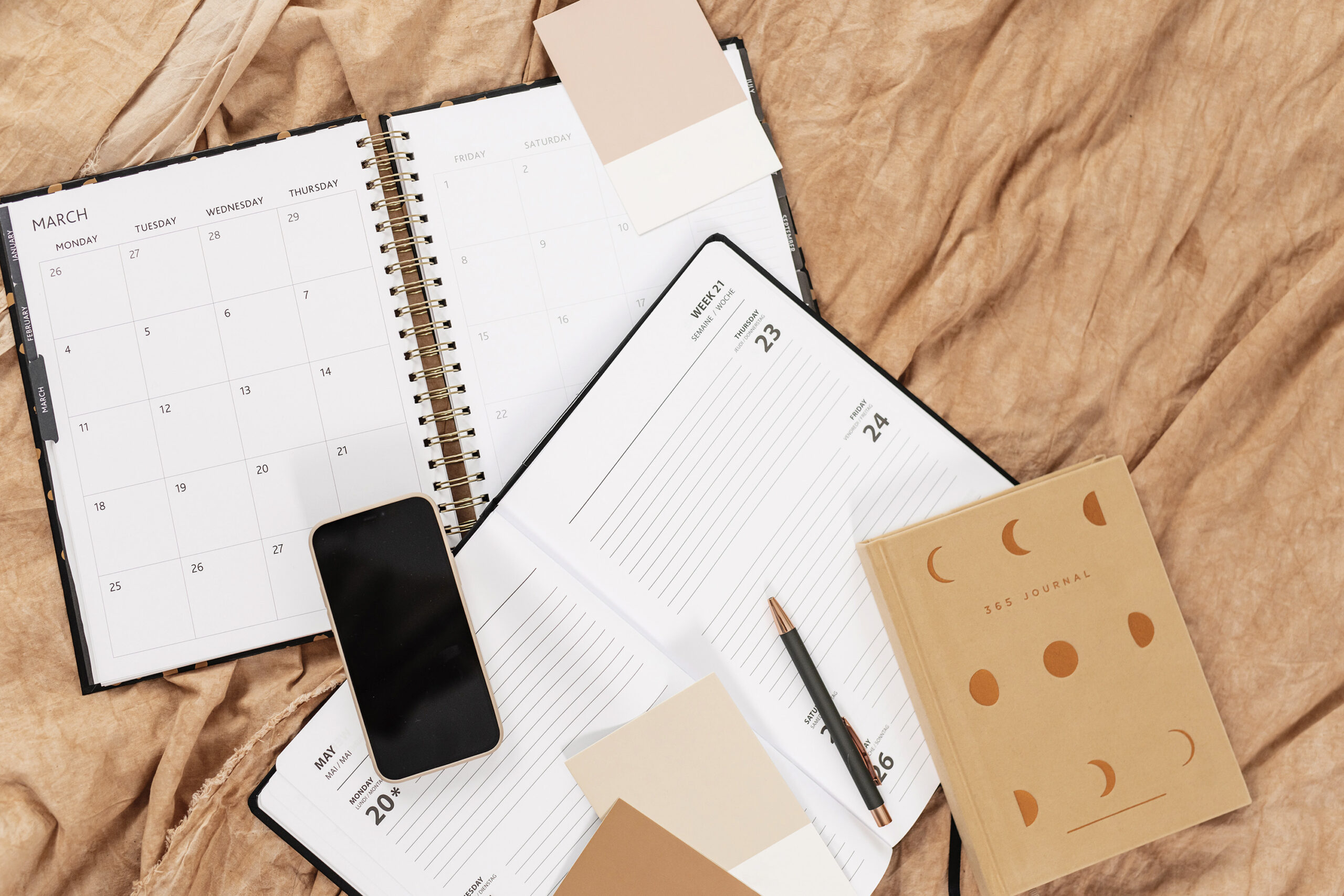
Planning for the Next Day
Planning for the day ahead is something we should all definitely be incorporating into our evening routines.
It’s honestly the key to making your mornings run smoother and fall into place more effortlessly.
Here are some easy steps to set yourself up for sweet morning success.
Create a To-Do List
Creating a to-do list for the next day is a simple yet effective way to reduce that dreaded morning stress.
When you write everything down the night before, you get it out of your head so you can start the day with a clear path forward.
• Brain Dump: Before you go to bed, jot down everything you need to accomplish the next day. This helps clear your mind, making it easier to fall asleep.
• Prioritize Tasks: Rank your tasks by importance. Put the most crucial items at the top so you know where to focus first thing in the morning.
• Break It Down: Large tasks can feel overwhelming. Break them into smaller, more manageable steps to make your list less intimidating.
It’s a wonderful feeling waking up and knowing exactly where you need to focus your time and energy.
It only takes a few minutes, but trust me, your morning self will thank you so much for this extra preparation!
Set Out Clothes and Essentials
Another great way to streamline your morning is by setting out your clothes and preparing any essentials you’ll need for the next day. This small step can save you time and reduce decision fatigue.
Way too often I have found myself staring blankly at my closet waiting for my outfit to just magically jump out at me. AVOID THIS!
Take a few minutes the night before and lay your clothes out. It’s not worth the time wasted in the morning.
Make sure to include accessories, shoes and your workout clothes the night before. This simple act eliminates the “What should I wear?” dilemma and speeds up your morning routine.
While you’re at it, go ahead and get your bag packed with everything you need tomorrow—laptop, notebooks, wallet, keys, and any other essentials. Doing this ahead of time means less frantic scrambling in the morning.
If you have a really busy morning ahead, you can even consider prepping your breakfast the night before. Overnight oats or smoothies can be a lifesaver.
By setting out clothes and essentials the night before, you remove obstacles that can slow you down in the morning.
You’ll move through your routine with ease, feeling more in control and less stressed. And less time wasted wondering where this is or what shoes do I wear with this skirt?
There are no decisions to be made. From what you eat to what you’re wearing to what your first task should be.
The guess work is completely gone.
These small steps will help you start your day on the right foot, making mornings actually enjoyable. Something you’ll look forward to each day instead of dread.
It might take a few extra minutes each evening but the clarity and ease you gain the next day is so worth the little bit of upfront work.
To Wrap this Up
Creating positive evening routines can be a simple and fun way to begin creating mornings that you actually want to wake up to.
Aligning your activities with your circadian rhythms, creating a calming routine and planning for the next day all contribute to restful nights and productive mornings.
Make these habits a part of your daily life, and you’ll soon see the long-term benefits that come with them.
Transform your nights and you’ll supercharge your days.
While you’re creating your new evening routine, go ahead and grab this FREE Progress Planner Printable to help keep you on track and make your new healthy habits stick!


